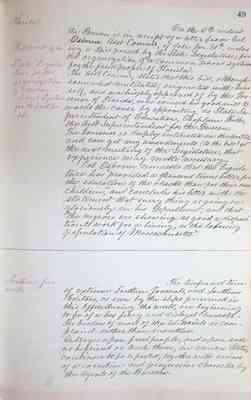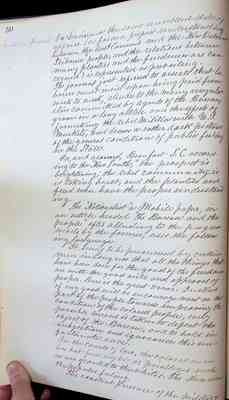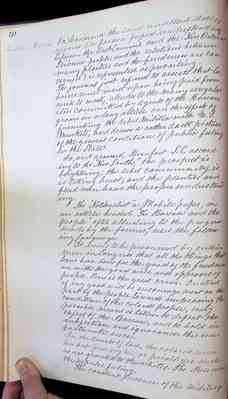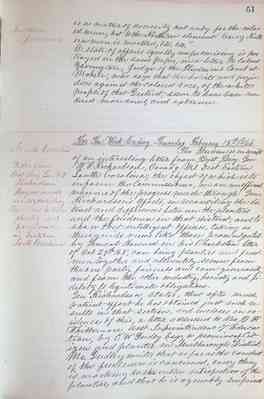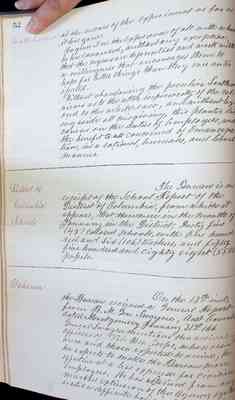Pages
16
49
Florida
Bill passed by the State Legisla ture for the Organization of a Common School System for the freed people
On the 8th instant the Bureau is in receipt of a letter from Col. Osborne Asst Comm'r, of date Jan. 20th, enclos ing a Bill passed by the State Legislature, for the organization of a Common School system for the freedpeople of Florida.
The Ass't Comm'r, states that this bill, although somewhat mutilated, originated with him self, and was highly approved of by the Governor of Florida, who evinced his good will towards the cause by appointing as State Superintendent of Education, Caplain Hobbs, the Ass't Superintendent for the Bureau.
The Governor is deeply interested in the matter, and can get any amendments (to the bill) at the next meeting of the Legislature, that experience may make necessary.
Col Osborne remarks that the Legislature has "provided a thousand times better for the education of the blacks than for their own children," and concludes his letter with the statement that every thing is going on gloriously in his Department, and that "the negroes are showing as good a disposi tion to work for a living, as the laboring population of Massachusetts."
Southern Journals.
The temper and tone of extreme Southern Journals, and Southern Editors, as seen by the slips preserved in this Office during the week, are beginning to be of a less firey and disloyal character. The burden of most of the Editorials is complaint rather than invective.
Outrages upon freedpeople, and upon such as befriend or teach them, in various States, continue to be reported, together with various of a corrective and progressive character by the Agents of the Bureau.
284
17
50
Southern Journals
In Louisiana the same unsettled state of affairs (as far as a perfect understanding between the Ass't Comm'r and the "New Orleans Tribune" people, and the relations between many planters and the freedmen are concerned) is represented as prevailing.
The journal just referred to asserts that laborers must insist upon being paid from week to week, alludes to the many irregular ities committed by Agents of the Bureau, groan in a long article over the effects of furnishing the rebel Militia with U.S. Muskets, and draws a rather dark picture of the general condition of public feeling in the State.
In, and around, Beaufort S.C. according to the "New South," the prospect is brightening; the rebel community is is taking heart, and the planters and freed men have the proper understand ing.
276 have been done for the good of the freemen are with the good will and approval of people. Here is the great error. Instead of any good will or encouragement on the part of the people towards improving the condition of the colored people, every possible means is taken to defeat the object of the Bureau, and to hold in subjection and ignorance this unfortunate race.
In the Courts of law, the colored man has but few rights or privileges such as are granted to the whites. The Press echoes the popular feeling.
The constant presence of the military
18
50
Southern Journals
In Louisiana the same unsettled state of affairs (as far as a perfect understanding between the Ass't Comm'r and the "New Orleans Tribune" people, and the relations between many planters and the freedmen are concerned) is represented as prevailing.
The journal just referred to asserts that laborers must insist upon being paid from week to week, alludes to the many irregular ities committed by Agents of the Bureau, groan in a long article over the effects of furnishing the rebel Militia with U.S. Muskets, and draws a rather dark picture of the general condition of public feeling in the State.
In, and around, Beaufort S.C. according to the "New South," the prospect is brightening; the rebel community is is taking heart, and the planters and freed men have the proper understand ing.
276
have been done for the good of the freemen are with the good will and approval of people. Here is the great error. Instead of any good will or encouragement on the part of the people towards improving the condition of the colored people, every possible means is taken to defeat the object of the Bureau, and to hold in subjection and ignorance this unfortunate race.
In the Courts of law, the colored man has but few rights or privileges such as are granted to the whites. The Press echoes the popular feeling.
The constant presence of the military
19
51
Southern Journals
is a matter of necessity not only for the color ed man, but to the NOrthern element. "Every North ern man is marked, Ets, Ets,"
A state of affairs equally unpromising is por trayed in the same paper, in a letter to Colonel Farrington, Judge of the Freedmen's Court at Mobile, who says that the habits and preju dices against the colored race, of the white people of that District, seem to have been ren dered more cruel, and extreme.
South Carolina Letter from Bvt Brig Gen. WP Richardson Progress made in reconciling differences between planters and freedmen in Eastern South Carolina
For the Week Ending Thursday February 15th 1866.
The Bureau is in receipt of an interesting letter from Brevt Brig. Gen. W.P. Richardson, Com'd'g Mil Dist. Eastern South Carolina; the object of which is to inform the Commissioner, in an unofficial manner of the progress made through Gen. Richardson's efforts, in reconciling the distrust and differences between the planters and the freedmen in that district, and to show that intelligent officers, taking as their guide views like those promulgated by General Howard in his Charleston letter of Oct. 27th/65, can bring planters and freedmen together and ultimately secure from the one party fairness and even generosity, and from the other industry, honesty and fidelity to legitimate obligations.
Gen Richardson states, that after much patient effort he has obtained just such results in that section, and encloses in evidence of this, a letter addressed to Rev. B.F. Whittemore, Asst Superintendent of Education, by CW Dudly Esq, a prominent Cit izen and planter in Marlborough District. Mr. Dudley writes that as far as the conduct of the freedmen is concerned, every thing is marking to the entire satisfaction of the planters, and that he is agreeably suprised
310
20
52
South Carolina
at the success of the experiment as far as it has gone.
He gives it as the Expeerence of all with whom he has conversed, without any exception, that the negroes are deferential and work with a willingness that encourages them to hope for better things than they ever anticipated.
Without abandoning the peculiar Southern views as to the utter inferiority of the colored to the white race, and without laying aside all misgiving, this planter dis courses on the duties of Employers, and the benefit to all concerned of Emancipation, in a rational, humane, and liberal manner.
District of Columbia Schools
The Bureau is in receipt of the School Report of the District of Columbia, from which it appears, that there were in the month of January in the District, Forty five (45) colored schools, with One hundred and six (106) teachers, and fifty five hundred and eighty eight (5588) pupils.
Alabama
On the 13th inst, the Bureau recieved a General Report from B.M. Gen. Swayne, Asst Comm'r dated Montgomery January 31st/66.
General Swayne mentions the arrival of officers of Vet. Pres. Corps, whose assist ance and those expected to arrive, he he expects to make the Bureau more effective at a less expense for civilian Employees. He has abstained from any marked extinsion of the Agency system until a deffinite bas[is? - scan is cut off]
241
